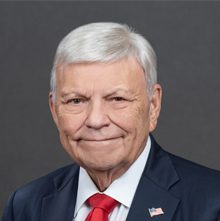Full Swing Fundamentals
Learning how to build a smooth golf swing is like growing the next generation of tradespeople.

Tom Brown and Steve Letko talk shop about the labor and material shortage in the industry, and how associations are working to address the concerns.
Tom Brown: Houston in May was terrific especially the PVF Roundtable’s golf outing, board breakfast and meeting.
Steve Letko: The Breakfast with the Board proved to be a brilliant idea as evidenced by the excellent attendance at the inaugural event. We, and I believe I speak for all board members, were delighted with the enthusiasm of the attendees and the appreciation expressed by the recipients of the scholarships. We all look forward to the next Breakfast with the Board.
Our two foursomes included Joe Costanzo, Shelton Delk and Chad Anderson (all associates of the Wolseley Industrial Group) along with Ginger Restovic, Sheryl Michalak and myself, joined by one of the recipients from Texas A&M accompanied by his professor and sponsor.
Our conversations were enlightening as to how well the PVF Roundtable Scholarship Programs are received, respected and appreciated.
TMB: Bob Hunter and his committee should be very pleased and proud of this successful fundraising event.
SL: Tom, you are so right. Bob Hunter and his crew did a remarkable job of planning, coordinating, and executing an excellent Don Caffee Scholarship Golf Outing. There were 326 golfers along with dozens of volunteers participating in what can only be referred to as a rain-free, epic event. One for the record book! Bob Hunter has announced that the Don Caffee Scholarship Golf Outing will clear $60,000 for the scholarship fund. Wow! Bob, a well-deserved “well done” and “thanks!”
TMB: Talking with Joe Costanzo at the meeting, Ferguson is again making a big contribution to the Roundtable’s education fund. It is stepping up big time. On top of all that, it will be making a big announcement for the October meeting.
SL: Joe Costanzo has indeed played a key role in convincing Ferguson to again step up and contribute another $25,000 to The PVF Scholarship Fund. In addition, Joe has been able to schedule Hall of Fame QB Terry Bradshaw, four-time Super Bowl champion, formally of the Pittsburg Steelers, to be our keynote speaker at the October meeting.
Ferguson has Terry Bradshaw under contract to do promotional appearances at various Ferguson sponsored events. Through the efforts of Joe Costanzo, Ferguson’s management team agreed with Joe that this event is worthy of the investment.
The October meeting will be held on Tuesday, October 17, at the Marriott Westchase, at 2900 Briarpark Dr., Houston, Texas. Networking will begin at 4:30 p.m. followed by a sit-down dinner and program.
The board anticipates that this will be a major event and urges everyone to register early using the PVF Roundtable website at www.pvf.org.
TMB: Many manufacturers have been commenting on two problems: shortages of raw materials and the lack of skilled workers to hire.
SL: Tom, let me address the skilled labor issue first.
The May jobs report was an anemic 138,000 jobs disappointment, however, not surprising as employers struggle to find enough skilled workers. The pool of skilled workers is graying and is being depleted through attrition due to retirement.
The Labor Participation Rate reported at the end of May was 62.7 percent. That translates to more than 90 million workers that remain out-of-the work force, yet a near record number of job openings remain unfilled.
Morrie Beschloss’s explanation of this phenomenon lies in the “paradox of displacement.”
This can be best explained by the rapidly changing nature of America’s lack of technical training, which was once covered by technical high schools and technical training centers, and has been displaced by liberal arts specialization at the high school and college levels.
The areas that badly need employees include high tech workers, engineers, mechanics, welders, pipe fitters, lathe operators, crane operators, construction workers, heavy equipment operators and laboratory technicians.
Major construction projects that are critical to infrastructure development both here in the U.S. and Canada are faced with the constraints of available labor to the PVF industry that directly influences the planning and implementation of critically needed construction starts.
The PVF Roundtable understands the need and has addressed the issue by setting up scholarships for technical schools to attract trainees for skilled trade positions in the PVF industry.
There is a large labor pool of untrained workers whose potential is untapped. These are individuals who are not suited for college level career paths, either by choice or circumstance, who have talent that can be developed with the proper training to pursue lucrative and rewarding alternate careers.
Now, let's move on to the subject of material shortages.
There are currently several initiatives in play that have the potential of influencing the supply of material. Anti-dumping penalties that are to take effect, anti-circumvention action and pending legal action regarding quality issues currently in play may have a damping effect of the supply of lower cost offshore materials pending the outcome.
An additional factor is the administration’s focus on “Made in America.” The U.S. has been exporting its manufacturing expertise and capacities for many years due to high taxation policies, restrictive regulations and crippling EPA rulings.
Legal exposure is also an issue effecting supply and demand. The substandard offshore materials being proliferated on the domestic market, coupled with the “hold harmless clauses” demanded in many major contracts and supply agreements, is increasingly migrating the demand to quality domestic products mitigating liability.
Increased demand for domestic material coupled with limited capacity in the U.S. has caused concern for the availability of certain commodities and high-grade materials required by the PVF industry as our economy expands. The administration’s policies are based on an expanding economy. As the economy responds, pressure will increase on both the labor and materials market.
TMB: Steve, you are currently attending the MCAA Spring meeting and I’ll bet several industry initiatives are being discussed. Please share them with us.
SL: The MCAA Governing Board Meeting focused on the development of the next generation of the MCAA’s Web-Based Estimating Manual and how manufacturers and suppliers can better position themselves in the pre-bid phase.
The Governing Board Executive Committee developed in-depth presentations to emphasize the importance of having as much product information as possible entered into the MCAA’s database for use in the estimating process associated with the bidding process.
MCAA data base and labor standards used in estimating have not only become a national standard, they have become a global standard.
The second presentation focused on the need for manufacturers, suppliers and member contractors to work closely together during the pre-bid phase. Close communication regarding specifications, new product offerings, pricing matrixes, availability of materials and T&C’s understanding are axioms for the preparation of a qualified competitive bid.
The dollar value of construction put in place showed a seasonally adjusted annual escalation rate of plus 3.6 percent as reported by the U.S. Department of Commerce. Most of the gain came from private construction market that were up 7 percent. Home building also was up with a 7.5 percent annual increase. The weak spot is public works, which is down 6.5 percent from a year ago.
The contractors attending the Governing Board Meeting gave credence to the data from the U.S. Department of Commerce with all reporting that business was strong.
With a strong market, the need for skilled tradesmen required in the mechanical contracting industry is a critical issue that is affecting the way the contractor approaches the decision-making process to bid and manage a project.
MCAA is working closely with its union partners to provide the necessary training
in the various skill sets required to populate the next generation skilled labor pool.
MCAA, through the Mechanical Contracting Education & Research Foundation (MCERF), is providing education programs and scholarships for the industry to aggressively address the need for new and qualified skilled tradesmen for a career path in the mechanical contracting industry.





